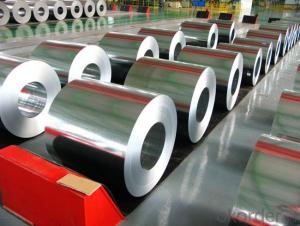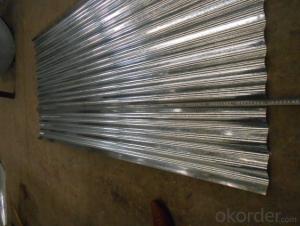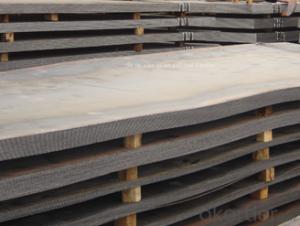Carbon Mild Steel Square Bar in Best Sale High Quality
- Loading Port:
- Tianjin
- Payment Terms:
- TT or LC
- Min Order Qty:
- 500 m.t.
- Supply Capability:
- 40000 m.t./month
OKorder Service Pledge
OKorder Financial Service
You Might Also Like
Carbon Mild Steel Square Bar in Best Sale High Quality
Main Structure:
Material: Steel
Dimensions: 60*60mm-150*150mm
Technique: Hot Rolled
Length: 2-12m
Standard: GB1499
Chemical Composition: C, Si, Mn, P, S, (B)
Alloy Or Not: Is Alloy
Shape: Square
Secondary Or Not: Non-secondary
Delivery: delivery on time
Type: steel square bar
Specifications:
Type | Steel billet / Square steel/ Steel square bar |
Standard grade | 3SP/PS, 5SP/PS, Q195, Q235, Q255, Q275, 20MnSi etc. |
MOQ | 1000 MT |
Technique | Hot rolled, Continuous casting and rolling |
Size | 50*50mm ~ 160*160mm |
Length | 3~12m |
Packing | Loose packing, in bundle |
Payment terms | T/T, L/C at sight, Usance L/C |
Trade terms | EXW, FOB, CFR, CIF |
Trans terms | FIO, FILO, FLT |
Inspection | Third party inspection accepted |
Delivery time | 15-30 days, according to the quantity |
Applications | carbon structural steel, wire rod, rod, deformed bars, profile steel, machine parts, and steel moulds etc . |
Note | Customized service is available (for sizes,length and chemical components etc.). |
Datas for Steel Grade:
Steel Grade | C % | Mn % | Si % | S % | P % |
Q195 | 0.06-0.12 | 0.25-0.50 | 0.30 Max | 0.04 Max. | 0.04 Max. |
Q235 | 0.12-0.22 | 0.30-0.60 | 0.30 Max. | 0.04 Max. | 0.04 Max. |
Q255 | 0.18-0.28 | 0.40-0.70 | 0.30 Max. | 0.045 Max. | 0.050 Max. |
Q275 | 0.27-0.38 | 0.50-0.80 | 0.30 Max. | 0.045 Max. | 0.045 Max. |
3SP | 0.14-0.22 | 0.40-0.85 | 0.15-0.30 | 0.050 Max. | 0.040 Max. |
5SP | 0.28-0.37 | 0.50-1.00 | 0.15-0.30 | 0.050 Max. | 0.040 Max. |
20MnSi | 0.17-0.25 | 1.00-1.60 | 0.40-0.80 | 0.050 Max. | 0.050 Max. |
Why choose us:
1. More than 10 years experience in this industry
2. 100,000 tons exporting per month
3. Professional foreign trade team
4. OEM&ODM capacity
5. High quality assured & competitive price
6. Try our best to meet your needs & save your budget
7. Very popular in Southeast Asia, Africa, Mid-East and South America etc.
8. VIP membership system, first time customers and long-term cooperation customers can get extra discount on some products.
Picture
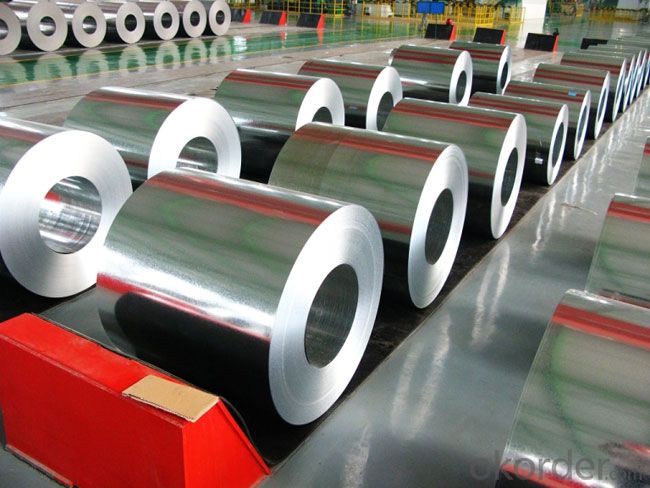
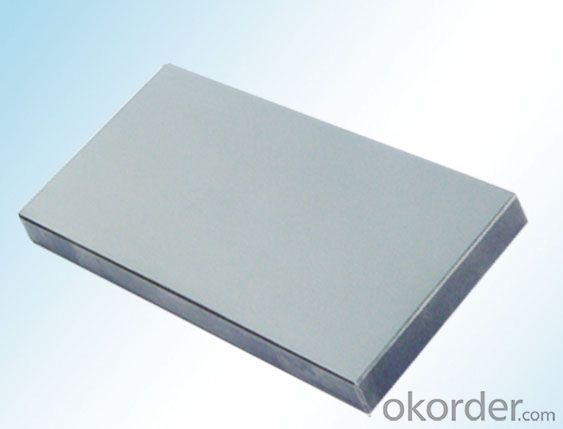
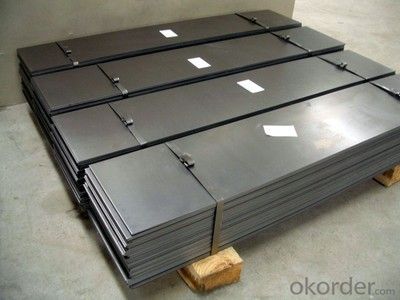
- Q:Can steel sheets be used for food-grade applications?
- Yes, steel sheets can be used for food-grade applications. However, it is crucial to ensure that the steel sheets are made from food-grade stainless steel, such as Type 304 or Type 316, which comply with specific sanitary regulations and have excellent corrosion resistance properties. Additionally, proper cleaning and maintenance practices must be followed to ensure the safety and hygiene of the food contact surfaces.
- Q:How do steel sheets handle thermal expansion?
- Steel sheets handle thermal expansion by expanding in size when heated and contracting when cooled. This expansion and contraction is accommodated through the flexibility and ductility of steel, allowing it to withstand and adjust to changes in temperature without significant damage or deformation.
- Q:What is the process of applying anti-corrosion treatments to steel sheets?
- The process of applying anti-corrosion treatments to steel sheets typically involves several steps. First, the steel sheets are thoroughly cleaned to remove any dirt, oil, or other contaminants that could affect the adhesion of the anti-corrosion coating. This is usually done through chemical cleaning or mechanical methods such as sandblasting. Once the surface is clean, a primer or pretreatment is applied to further enhance the adhesion of the anti-corrosion coating. This primer helps to create a protective barrier between the steel and the corrosive elements. The type of primer used may vary depending on the specific requirements and the type of anti-corrosion treatment being applied. After the primer has dried or cured, the actual anti-corrosion treatment is applied. This can be done through various methods such as spraying, dipping, or electroplating. The specific treatment used may vary depending on the desired level of corrosion resistance and the environmental conditions the steel sheets will be exposed to. Once the anti-corrosion treatment has been applied, the steel sheets are typically allowed to cure or dry according to the manufacturer's instructions. This ensures that the treatment fully adheres to the steel and provides maximum protection against corrosion. Overall, the process of applying anti-corrosion treatments to steel sheets involves cleaning, priming, applying the treatment, and allowing it to cure. This helps to significantly extend the lifespan of the steel sheets and protect them from the damaging effects of corrosion.
- Q:Can steel sheets be used in marine applications?
- Steel sheets are suitable for marine applications, as they possess high strength and durability. This material is widely chosen due to its ability to endure the challenging conditions of saltwater, as well as its resistance to corrosion. In the construction of ships, offshore platforms, and other marine structures, steel sheets are frequently employed to ensure structural integrity. They can be easily customized to meet specific design requirements. Moreover, to enhance their corrosion resistance in saltwater environments, steel sheets can be coated with protective layers like anti-corrosion paints or galvanization. Overall, steel sheets are a dependable and frequently utilized material across various marine applications.
- Q:How do steel sheets compare to other materials like aluminum or stainless steel?
- Steel sheets have several advantages over other materials like aluminum or stainless steel. Firstly, steel sheets are generally much stronger and more durable than aluminum or stainless steel sheets. This makes them ideal for applications that require high strength and resistance to wear and tear. Secondly, steel sheets are more cost-effective compared to stainless steel sheets. Steel is usually less expensive to produce and purchase, making it a more economical choice for many industries. Additionally, steel sheets can be easily recycled, further reducing their overall cost and environmental impact. On the other hand, aluminum sheets are lighter in weight than steel sheets, which can be advantageous in certain applications where weight is a concern, such as in the aerospace industry. Aluminum is also naturally resistant to corrosion, making it a suitable choice for outdoor applications or environments with high humidity. Stainless steel sheets, on the other hand, are highly resistant to corrosion and staining, making them ideal for applications where hygiene and aesthetics are important, such as in the food and medical industries. Stainless steel sheets also have excellent heat resistance properties, making them suitable for high-temperature applications. In summary, steel sheets offer superior strength and durability compared to aluminum or stainless steel sheets, while also being more cost-effective. However, aluminum and stainless steel sheets have their own unique properties that make them suitable for specific applications. The choice between these materials ultimately depends on the specific requirements and constraints of the project or industry.
- Q:What is the difference between a galvanized and painted steel sheet?
- A galvanized steel sheet is one that has been coated with a layer of zinc to protect it from corrosion. This process, known as galvanization, involves immersing the steel sheet in a bath of molten zinc, which forms a bond with the underlying steel. This zinc coating acts as a sacrificial anode, meaning that it corrodes instead of the steel when exposed to elements such as moisture and oxygen. As a result, galvanized steel sheets have excellent corrosion resistance and can last for a long time in outdoor environments. On the other hand, a painted steel sheet is one that has been coated with a layer of paint to provide both aesthetic appeal and additional protection against corrosion. The paint acts as a barrier between the steel surface and the surrounding environment, preventing moisture and other corrosive substances from coming into direct contact with the steel. This helps to prolong the lifespan of the steel sheet and maintain its appearance. In terms of appearance, galvanized steel sheets have a characteristic silver-gray color due to the zinc coating, while painted steel sheets can come in a wide range of colors depending on the type of paint used. Galvanized steel sheets also have a textured surface due to the presence of the zinc coating, while painted steel sheets can have a smoother or textured finish depending on the application technique. Ultimately, the main difference between galvanized and painted steel sheets lies in the method of protection against corrosion. Galvanized steel relies on the sacrificial corrosion of zinc, while painted steel relies on the barrier effect of the paint. The choice between the two depends on factors such as the specific application, aesthetic requirements, and the level of corrosion resistance needed.
- Q:What are the different surface finishes for steel sheets?
- Some of the different surface finishes for steel sheets include mill finishes, brushed finishes, mirror finishes, embossed finishes, and patterned finishes.
- Q:Can steel sheets be used in corrosive environments?
- Yes, steel sheets can be used in corrosive environments, but it is important to choose the right type of steel that is resistant to corrosion, such as stainless steel or galvanized steel. These types of steel have protective coatings or alloys that prevent or minimize corrosion, making them suitable for use in corrosive environments.
- Q:Are steel sheets suitable for water tanks?
- Yes, steel sheets are suitable for water tanks. Steel is a strong and durable material that can withstand the weight of water and provide long-lasting protection against corrosion. Additionally, steel tanks can be easily customized and are often used for storing large volumes of water in various industries and applications.
- Q:Can the steel sheets be used for insulation purposes?
- Typically, steel sheets are not employed for insulation purposes. Due to its high conductivity, steel easily transfers heat and cold. Consequently, it is ill-suited for insulation as it fails to effectively hinder the transfer of thermal energy. Conversely, insulation materials are explicitly designed to minimize heat transfer and enhance energy efficiency in buildings and other structures. Foam, fiberglass, and cellulose are examples of common insulation materials that exhibit significantly greater resistance to heat flow than steel.
1. Manufacturer Overview |
|
|---|---|
| Location | |
| Year Established | |
| Annual Output Value | |
| Main Markets | |
| Company Certifications | |
2. Manufacturer Certificates |
|
|---|---|
| a) Certification Name | |
| Range | |
| Reference | |
| Validity Period | |
3. Manufacturer Capability |
|
|---|---|
| a)Trade Capacity | |
| Nearest Port | |
| Export Percentage | |
| No.of Employees in Trade Department | |
| Language Spoken: | |
| b)Factory Information | |
| Factory Size: | |
| No. of Production Lines | |
| Contract Manufacturing | |
| Product Price Range | |
Send your message to us
Carbon Mild Steel Square Bar in Best Sale High Quality
- Loading Port:
- Tianjin
- Payment Terms:
- TT or LC
- Min Order Qty:
- 500 m.t.
- Supply Capability:
- 40000 m.t./month
OKorder Service Pledge
OKorder Financial Service
Similar products
New products
Hot products
Hot Searches
Related keywords
